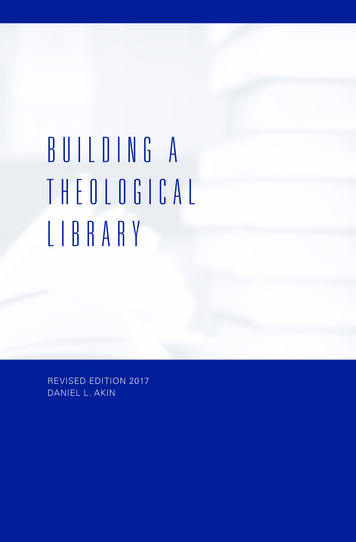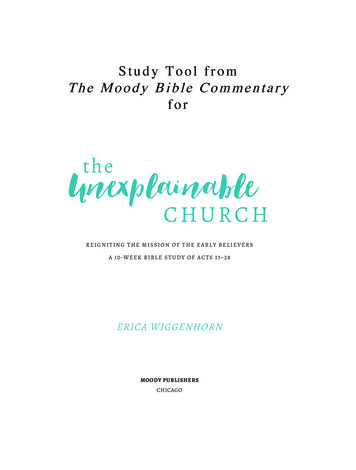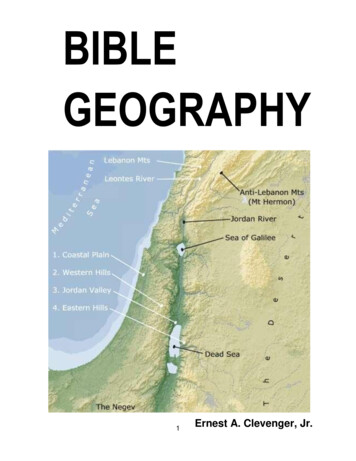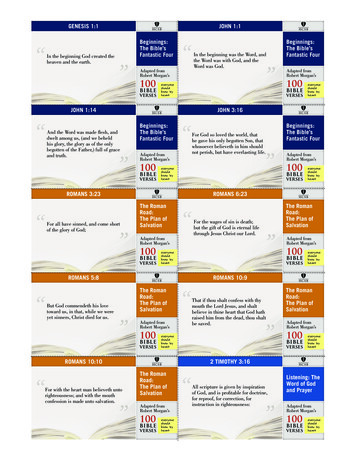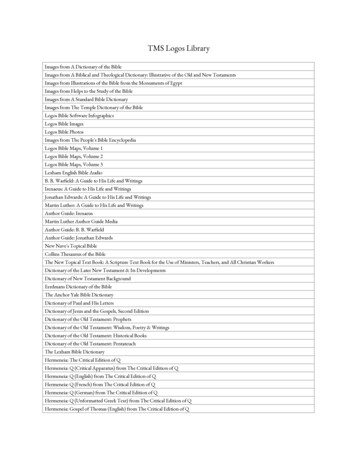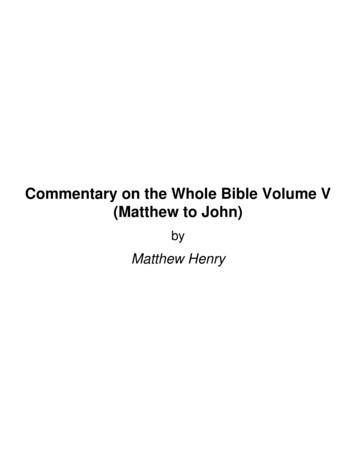
Transcription
Commentary on the Whole Bible Volume V(Matthew to John)byMatthew Henry
About Commentary on the Whole Bible Volume V (Matthew to John) byMatthew HenryTitle:URL:Author(s):Publisher:Print Basis:Source:Rights:Date Created:General Comments:Contributor(s):CCEL Subjects:LC Call no:LC Subjects:Commentary on the Whole Bible Volume V (Matthew to , MatthewGrand Rapids, MI: Christian Classics Ethereal Library1706-1721Logos, Inc.Public domain. May be copied and distributed freely.2000-07-09Unabridged and carefully proofed.Ernie Stefanik (Editor)All; Bible; ClassicBS490.H4The BibleWorks about the Bible
Commentary on the Whole Bible Volume V (Matthew to John)Matthew HenryTable of ContentsAbout This Book.Title Page. . . . .Preface: MatthewMatthew. . . . . .Introduction. . .Chapter I. . . . .Chapter II. . . .Chapter III. . . .Chapter IV. . . .Chapter V. . . .Chapter VI. . . .Chapter VII. . .Chapter VIII. . .Chapter IX. . . .Chapter X. . . .Chapter XI. . . .Chapter XII. . .Chapter XIII. . .Chapter XIV. . .Chapter XV. . .Chapter XVI. . .Chapter XVII. .Chapter XVIII. .Chapter XIX. . .Chapter XX. . .Chapter XXI. . .Chapter XXII. .Chapter XXIII. .Chapter XXIV. .Chapter XXV. .Chapter XXVI. .Chapter XXVII.Chapter XXVIII.Mark. . . . . . . . .Introduction. . .to John.iii.p. iip. 1p. 2p. 12p. 12p. 14p. 25p. 42p. 58p. 82p. 116p. 146p. 166p. 190p. 214p. 239p. 264p. 290p. 316p. 337p. 362p. 386p. 404p. 428p. 450p. 471p. 498p. 524p. 550p. 586p. 612p. 655p. 696p. 716p. 716
Commentary on the Whole Bible Volume V (Matthew to John)Chapter I. . . .Chapter II. . .Chapter III. . .Chapter IV. . .Chapter V. . .Chapter VI. . .Chapter VII. .Chapter VIII. .Chapter IX. . .Chapter X. . .Chapter XI. . .Chapter XII. .Chapter XIII. .Chapter XIV. .Chapter XV. .Chapter XVI. .Luke. . . . . . . .Introduction. .Chapter I. . . .Chapter II. . .Chapter III. . .Chapter IV. . .Chapter V. . .Chapter VI. . .Chapter VII. .Chapter VIII. .Chapter IX. . .Chapter X. . .Chapter XI. . .Chapter XII. .Chapter XIII. .Chapter XIV. .Chapter XV. .Chapter XVI. .Chapter XVII.Chapter XVIII.Chapter XIX. .Chapter XX. .Chapter XXI. .Chapter XXII.ivMatthew Henry.p. 717p. 731p. 739p. 747p. 758p. 768p. 784p. 794p. 805p. 819p. 833p. 842p. 855p. 866p. 887p. 900p. 909p. 909p. 910p. 944p. 966p. 979p. 996p. 1008p. 1022p. 1037p. 1051p. 1072p. 1092p. 1112p. 1134p. 1151p. 1165p. 1184p. 1204p. 1216p. 1231p. 1247p. 1258p. 1270
Commentary on the Whole Bible Volume V (Matthew to John)Chapter XXIII. . . . . . . . . . . . . . .Chapter XXIV. . . . . . . . . . . . . . .John. . . . . . . . . . . . . . . . . . . . . .Introduction. . . . . . . . . . . . . . . .Chapter I. . . . . . . . . . . . . . . . . .Chapter II. . . . . . . . . . . . . . . . .Chapter III. . . . . . . . . . . . . . . . .Chapter IV. . . . . . . . . . . . . . . . .Chapter V. . . . . . . . . . . . . . . . .Chapter VI. . . . . . . . . . . . . . . . .Chapter VII. . . . . . . . . . . . . . . .Chapter VIII. . . . . . . . . . . . . . . .Chapter IX. . . . . . . . . . . . . . . . .Chapter X. . . . . . . . . . . . . . . . .Chapter XI. . . . . . . . . . . . . . . . .Chapter XII. . . . . . . . . . . . . . . .Chapter XIII. . . . . . . . . . . . . . . .Chapter XIV. . . . . . . . . . . . . . . .Chapter XV. . . . . . . . . . . . . . . .Chapter XVI. . . . . . . . . . . . . . . .Chapter XVII. . . . . . . . . . . . . . .Chapter XVIII. . . . . . . . . . . . . . .Chapter XIX. . . . . . . . . . . . . . . .Chapter XX. . . . . . . . . . . . . . . .Chapter XXI. . . . . . . . . . . . . . . .Indexes. . . . . . . . . . . . . . . . . . . .Index of Scripture References. . . .Index of Scripture Commentary. . .Index of Pages of the Print Edition.vMatthew Henry.p. 1290p. 1308p. 1332p. 1332p. 1333p. 1368p. 1384p. 1410p. 1442p. 1472p. 1507p. 1536p. 1582p. 1610p. 1634p. 1671p. 1705p. 1733p. 1757p. 1775p. 1799p. 1831p. 1860p. 1889p. 1916p. 1939p. 1939p. 1963p. 1964
Commentary on the Whole Bible Volume V (Matthew to John)viMatthew Henry
Commentary on the Whole Bible Volume V (Matthew to John)Matthew Henry'sCommentary on the Whole BibleUnabridgedVolume VMatthew to JohnMatthew Henry
Commentary on the Whole Bible Volume V (Matthew to John)Matthew HenryP R E F A C E.iiiMatthew to JohnThe one half of our undertaking upon the New Testament30 is now, by the assistance of divinegrace, finished, and presented to the reader, who, it is hoped, the Lord working with it, may herebybe somewhat helped in understanding and improving the sacred history of Christ and his apostles,and in making it, as it certainly is, the best exposition of our creed, in which these inspired writersare summed up, as is intimated by that evangelist who calls his gospel A Declaration of those thingswhich are most surely believed among us, Luke i. 1. And, as there is no part of scripture in thebelief of which it concerns more to be established, so there is none with which the generality ofChristians are more conversant, or which they speak of more frequently. It is therefore our duty,by constant pains in meditation and prayer, to come to an intimate acquaintance with the true intentand meaning of these narratives, what our concern is in them, and what we are to build upon themand draw from them; that we may not rest in such a knowledge of them as that which we had whenin our childhood we were taught to read English out of the translation and Greek out of the originalsof these books. We ought to know them as the physician does his dispensatory, the lawyer his booksof reports, and the sailor his chart and compass; that is, to know how to make use of them in thatto which we apply ourselves as our business in this world, which is to serve God here and enjoyhim hereafter, and both in Christ the Mediator.The great designs of the Christian institutes (of which these books are the fountains andfoundations) were, to reduce the children of men to the fear and love of God, as the commandingactive principle of their observance of him, and obedience to him,—to show them the way of theirreconciliation to him and acceptance with him, and to bring them under obligations to Jesus Christas Mediator, and thereby to engage them to all instances of devotion towards God and justice andcharity towards all men, in conformity to the example of Christ, in obedience to his law, and inpursuance of his great intentions. What therefore I have endeavoured here has been with this view,to make these writings serviceable to the faith, holiness, and comfort of good Christians.Now that these writings, thus made use of to serve these great and noble designs, may havetheir due influence upon us, it concerns us to be well established in our belief of their divine origin.And here we have to do with two sorts of people. Some embrace the Old Testament, but set thatup in opposition to the New, pleading that, if that be right, this is wrong; and these are the Jews.Others, though they live in a Christian nation, and by baptism wear the Christian name, yet, underpretence of freedom of thought, despise Christianity, and consequently reject the New Testament,and therefore the Old of course. I confess it is strange that any now who receive the Old Testament30It may be proper to apprise the reader that the volume to which this preface was originally prefixed included the Acts of theApostles, which in the present edition will commence the second volume, in order to secure a more equal division of the NewTestament—the commentary on the remaining books being less extended than the author contemplated.—Ed.2
Commentary on the Whole Bible Volume V (Matthew to John)Matthew Henryshould reject the New, since, besides all the particular proofs of the divine authority of the NewTestament, there is such an admirable harmony between it and the Old. It agrees with the Old inall the main intentions of it, refers to it, builds upon it, shows the accomplishment of its types andprophecies, and thereby is the perfection and crown of it. Nay, if it be not true, the Old Testamentmust be false, and all the glorious promises which shine so brightly in it, and the performance ofwhich was limited within certain periods of time, must be a great delusion, which we are sure theyare not, and therefore must embrace the New Testament to support the reputation of the Old.Those things in the Old Testament which the New Testament lays aside are the peculiarity ofthe Jewish nation and the observances of the ceremonial law, both which certainly were of divineappointment; and yet the New Testament does not at all clash with the Old; for,1. They were always designed to be laid aside in the fulness of time. No other is to be expectedthan that the morning-star should disappear when the sun rises; and the latter parts of the OldTestament often speak of the laying aside of those things, and of the calling in of the Gentiles.2. They were very honourable laid aside, and rather exchanged for that which was more nobleand excellent, more divine and heavenly. The Jewish church was swallowed up in the Christian,the mosaic ritual in evangelical institutions. So that the New Testament is no more the undoing ofthe Old than the sending of a youth to the university is the undoing of his education in thegrammar-school.3. Providence soon determined this controversy (which is the only thing that seemed acontroversy between the Old Testament and the New) by the destruction of Jerusalem, the desolationsof the temple, the dissolution of the temple-service, and the total dispersion of all the remains ofthe Jewish nation, with a judicial defeat of all the attempts to incorporate it again, now for above1600 years; and this according to the express predictions of Christ, a little before his death. And,as Christ would not have the doctrine of his being the Messiah much insisted on till the greatconclusive proof of it was given by his resurrection from the dead, so the repeal of the ceremoniallaw, as to the Jews, was not much insisted on, but their keeping up the observation of it was connivedat, till the great conclusive proof of its repeal was given by the destruction of Jerusalem, whichmade the observation of it for ever impracticable. And the manifest tokens of divine wrath whichthe Jews, considered as a people, even notwithstanding the prosperity of particular persons amongthem, continue under to this day, is a proof, not only of the truth of Christ's predictions concerningthem, but that they lie under a greater guilt than that of idolatry (for which they lay under a desolationof 70 years), and this can be no other than crucifying Christ, and rejecting his gospel.Thus evident it is that, in our expounding of the New Testament, we are not undoing what wedid in expounding the Old; so far from it that we may appeal to the law and the prophets for theconfirmation of the great truth which the gospels are written to prove—That our Lord Jesus is theMessiah promised to the fathers, who should come, and we are to look for no other. For though hisappearing did not answer the expectation of the carnal Jews, who looked for a Messiah in externalpomp and power, yet it exactly answered all the types, prophecies, and promises, of the OldTestament, which all had their accomplishment in him; and even his ignominious sufferings, which3
Commentary on the Whole Bible Volume V (Matthew to John)Matthew Henryare the greatest stumbling-block to the Jews, were foretold concerning the Messiah; so that if hehad not submitted to them we had failed in our proof; so fat it is from being weakened by them.Bishop Kidder's Demonstration of the Christian's Messiah has abundantly made out this truth, andanswered the cavils (for such they are, rather than arguments) of the Jews against it, above any inour language.But we live in an age when Christianity and the New Testament are more virulently and daringlyattacked by some within their own bowels than by those upon their borders. Never were Mosesand his writings so arraigned and ridiculed by any Jews, or Mahomet and his Alcoran by anyMussulmans, as Christ and his gospel by men that are baptized and called Christians; and this, notunder colour of any other divine revelation, but in contempt and defiance of all divine revelation;and not by way of complaint that they meet with that which shocks their faith, and which, throughtheir own weakness, they cannot get over, and therefore desire to be instructed in, and helped inthe understanding of, and the reconciling of them to the truth which they have received, but by wayof resolute opposition, as if they looked upon it as their enemy, and were resolved by all meanspossible to be the ruin of it, though they cannot say what evil it has done to the world or to them.If the pretence of it has transported many in the church of Rome into such corruptions of worshipand cruelties of government as are indeed the scandal of human nature, yet, instead of being therebyprejudiced against pure Christianity, they should the rather appear more vigorously in defence ofit, when they see so excellent an institution as this is in itself so basely abused and misrepresented.They pretend to a liberty of thought in their opposition to Christianity, and would be distinguishedby the name of free-thinkers. I will not here go about to produce the arguments which, to all thatare not wilfully ignorant and prejudiced against the truth, are sufficient to prove the divine originand authority of the doctrine of Christ. The learned find much satisfaction in reading the apologiesof the ancients for the Christian religion, when it was struggling with the polytheism and idolatryof the Gentiles. Justin Martyr and Tertullian, Lactantius and Minutius Felix, wrote admirable indefence of Christianity, when it was further sealed by the blood of the martyrs. But its patrons andadvocates in the present day have another sort of enemies to deal with. The antiquity of the pagantheology, its universal prevalence, the edicts of princes, and the traditions and usages of the country,are not now objected to Christianity; but I know not what imaginary freedom of thought, and anunheard-of privilege of human nature, are assumed, not to be bound by any divine revelationwhatsoever. Now it is easy to make out,1. That those who would be thought thus to maintain a liberty of thinking as one of the privilegesof human nature, and in defence of which they will take up arms against God himself, do notthemselves think freely, nor give others leave to do so. In some of them a resolute indulgence ofthemselves in those vicious courses which they know the gospel if they admit it will make veryuneasy to them, and a secret enmity to a holy heavenly mind and life, forbid them all free thought;for so strong a prejudice have their lusts and passions laid them under against the laws of Christthat they find themselves under a necessity of opposing the truths of Christ, upon which these lawsare founded. Perit judicium, quando res transit in affectum—The judgment is overcome, when the4
Commentary on the Whole Bible Volume V (Matthew to John)Matthew Henrydecision is referred to the affections. Right or wrong, Christ's bonds must be broken, and his cordscast from them; and therefore, how evident soever the premises be, the conclusion must be denied,if it tend to fasten these bands and cords upon them; and where is the freedom of thought then?While they promise themselves liberty, they themselves are the servants of corruption; for of whoma man is overcome of the same is he brought into bondage. In others of them, a reigning pride andaffectation of singularity, and a spirit of contradiction, those lusts of the mind, which are as impetuousand imperious as any of the lusts of the flesh and of the world, forbid a freedom of thinking, andenslave the soul in all its enquiries after religion. Those can no more think freely who resolve theywill think by themselves than those can who resolve to think with their neighbours. Nor will theygive others liberty to think freely; for it is not by reason and argument that they go about to convinceus, but by jest and banter, and exposing Christianity and its serious professors to contempt. Now,considering how natural it is to most men to be jealous for their reputation, this is as great animposition as can possibly be; and the unthinking are as much kept from free-thinking by the fearof being ridiculed in the club of those who set up for oracles in reason as by the fear of being cursed,excommunicated, and anathematized, by the counsel of those who set up for oracles in religion.And where is the free-thinking then?2. That those who will allow themselves a true liberty of thinking, and will think seriously,cannot but embrace all Christ's sayings, as faithful, and well worthy of all acceptation. Let thecorrupt bias of the carnal heart towards the world, and the flesh, and self (the most presumptuousidol of the three) be taken away, and let the doctrine of Christ be proposed first in its true colours,as Christ and his apostles have given it to us, and in its true light, with all its proper evidence,intrinsic and extrinsic; and then let the capable soul freely use its rational powers and faculties, andby the operation of the Spirit of grace, who alone works faith in all that believe, even the highthought, when once it becomes a free thought, freed from the bondage of sin and corruption, will,by a pleasing and happy power, be captivated, and brought into obedience to Christ; and, when hethus makes it free, it will be free indeed. Let any one who will give himself leave to think impartially,and be at the pains to think closely, read Mr. Baxter's Reasons for the Christian Religion, and hewill find both that it goes to the bottom, and lays the foundation deep and firm, and also that itbrings forth the top-stone in a believer's consent to God in Christ, to the satisfaction of any that aretruly concerned about their souls and another world. The proofs of the truths of the gospel havebeen excellently well methodized, and enforced likewise, by bishop Stillingfleet, in his OriginesSacræ; by Grotius, in his book of the Truth of the Christian Religion; by Dr. Whitby, in his GeneralPreface to his Commentary on the New Testament; and of late by Mr. Ditton, very argumentatively,in his discourse concerning the Resurrection of Jesus Christ; and many others have herein doneworthily. And I will not believe any man who rejects the New Testament and the Christian religionto have thought freely upon the subject, unless he has, with humility, seriousness, and prayer toGod for direction, deliberately read these or the like books, which, it is certain, were written bothwith liberty and clearness of thought.5
Commentary on the Whole Bible Volume V (Matthew to John)Matthew HenryFor my own part, if my thoughts were worth any one's notice, I do declare I have thought ofthis great concern with all the liberty that a reasonable soul can pretend to, or desire; and the resultis that the more I think, and the more freely I think, the more fully I am satisfied that the Christianreligion is the true religion, and that which, if I submit my soul sincerely to it, I may venture mysoul confidently upon. For when I think freely,1. I cannot but think that the God who made man a reasonable creature by his power has aright to rule him by his law, and to oblige him to keep his inferior faculties of appetite and passion,together with the capacities of thought and speech, in due subjection to the superior powers ofreason and conscience. And, when I look into my own heart, I cannot but think that it was thiswhich my Maker designed in the order and frame of my soul, and that herein he intended to supporthis own dominion in me.2. I cannot but think that my happiness is bound up in the favour of God, and that his favourwill, or will not, be towards me, according as I do, or do not, comply with the laws and ends of mycreation,—that I am accountable to this God, and that from him my judgment proceeds, not onlyfor this world, but for my everlasting state.3. I cannot but think that my nature is very unlike what the nature of man was as it came outof the Creator's hands,—that it is degenerated from its primitive purity and rectitude. I find in myselfa natural aversion to my duty, and to spiritual and divine exercises, and a propensity to that whichis evil, such an inclination towards the world and the flesh as amounts to a propensity to backslidefrom the living God.4. I cannot but think that I am therefore, by nature, thrown out of the favour of God; for thoughI think he is a gracious and merciful God, yet I think he is also a just and holy God, and that I ambecome, by sin, both odious to his holiness and obnoxious to his justice. I should not think freely,but very partially, if I should think otherwise. I think I am guilty before God, have sinned, andcome short of glorifying him, and of being glorified with him.5. I cannot but think that, without some special discovery of God's will concerning me, andgood-will to me, I cannot possibly recover his favour, be reconciled to him, or be so far restoredto my primitive rectitude as to be capable of serving my Creator, and answering the ends of mycreation, and becoming fit for another world; for the bounties of Providence to me, in commonwith the inferior creatures, cannot serve either as assurances that God is reconciled tome or meansto reconcile me to God.6. I cannot but think that the way of salvation, both from the guilt and from the power of sin,by Jesus Christ, and his mediation between God and man, as it is revealed by the New Testament,is admirable will fitted to all the exigencies of my case, to restore me both to the favour of Godand to the government and enjoyment of myself. Here I see a proper method for the removing ofthe guilt of sin (that I may not die by the sentence of the law) by the all-sufficient merit andrighteousness of the Son of God in our nature, and for the breaking of the power of sin (that I maynot die by my own disease) by the all-sufficient influence and operation of the Spirit of God uponour nature. Every malady has herein its remedy, every grievance is hereby redressed, and in such6
Commentary on the Whole Bible Volume V (Matthew to John)Matthew Henrya way as advances the honour of all the divine attributes and is suited and accommodated to humannature.7. I cannot but think that what I find in myself of natural religion does evidently bear testimonyto the Christian religion; for all that truth which is discovered to me by the light of nature isconfirmed, and more clearly discovered, by the gospel; the very same thing which the light of naturegives me a confused sight of (like the sight of men as trees walking) the New Testament gives mea clear and distinct sight of. All that good which is pressed upon me by the law of nature is morefully discovered to me, and I find myself much more strongly bound to it by the gospel of Christ,the engagements it lays upon me to my duty, and the encouragements and assistances it gives mein my duty. And this is further confirming to me that there, just there, where natural light leavesme at a loss, and unsatisfied—tells me that hitherto it can carry me, but no further—the gospeltakes me up, helps me out, and gives me all the satisfaction I can desire, and that is especially inthe great business of the satisfying of God's justice for the sin of man. My own conscience asks,Wherewith shall I come before the Lord, and bow myself before the most high God? Will he bepleased with thousands of rams? But I am still at a loss; I cannot frame a righteousness from anything I am, or have, in myself, or from any thing I can do for God or present to God, wherein I dareappear before him; but the gospel comes, and tells me that Jesus Christ had made his soul an offeringfor sin, and God has declared himself well-pleased with all believers in him; and this makes meeasy.8. I cannot but think that the proofs by which God has attested the truth of the gospel are themost proper that could be given in a case of this nature—that the power and authority of theRedeemer in the kingdom of grace should be exemplified to the world, not by the highest degreeof the pomp and authority of the kings of the earth, as the Jews expected, but by the evidences ofhis dominion in the kingdom of nature, which is a much greater dignity and authority than any ofthe kings of the earth ever pretended to, and is no less than divine. And his miracles being generallywrought upon men, not only upon their bodies, as they were mostly when Christ was here uponearth, but, which is more, upon their minds, as they were mostly after the pouring out of the Spiritin the gift of tongues and other supernatural endowments, were the most proper confirmationspossible of the truth of the gospel, which was designed for the making of men holy and happy.9. I cannot but think that the methods taken for the propagation of this gospel, and the wonderfulsuccess of those methods, which are purely spiritual and heavenly, and destitute of all secularadvantages and supports, plainly show that it was of God, for God was with it; and it could neverhave spread as it did, in the face of so much opposition, if it had not been accompanied with apower from on high. And the preservation of Christianity in the world to this day, notwithstandingthe difficulties it has struggles with, is to me a standing miracle for the proof of it.10. I cannot but think that the gospel of Christ has had some influence upon my soul, has hadsuch a command over me, and been such a comfort to me, as is a demonstration to myself, thoughit cannot be so to another, that it is of God. I have tasted in it that the Lord is gracious; and themost subtle disputant cannot convince one who has tasted honey that it is not sweet.7
Commentary on the Whole Bible Volume V (Matthew to John)Matthew HenryAnd now I appeal to him who knows the thoughts and intents of the heart that in all this I thinkfreely (if it be possible for a man to know that he does so), and not under the power of any bias.Whether we have reason to think that those who, without any colour of reason, not only usurp, butmonopolize, the character of free-thinkers, do so, let those judge who easily observe that they donot speak sincerely, but industriously dissemble their notions; and one instance I cannot but noticeof their unfair dealing with their readers—that when, for the diminishing of
Commentary on the Whole Bible Volume V (Matthew to John) Matthew Henry should reject the New, since, besides all the particular proofs of the divine authority of the New Testament, there is such an admirable harmony between it and the Old.



